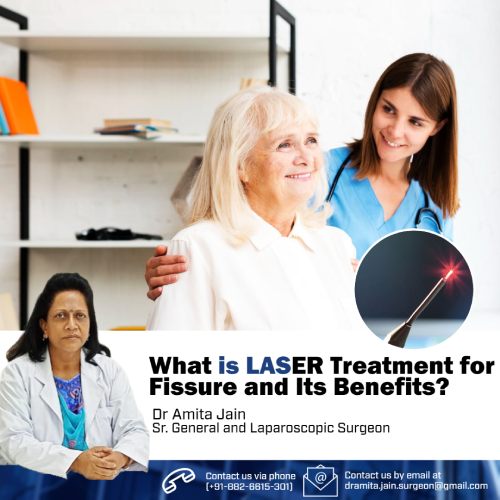Explains India’s Top Laparoscopy Surgeon for Fissure, Dr Amita Jain
A fissure refers to a minor incision or a tear in the skin lining. These fissures typically occur when one passes large or hardened stool during a bowel movement. Although not life-threatening or severe, this condition can be effectively addressed through various treatments, such as medication, laser treatment, or therapy.
Laser sphincterotomy, also known as LASER treatment, is chosen for patients experiencing chronic fissures. In this procedure, a surgeon employs a laser to make an incision, facilitating the relaxation of the constricted anal sphincter muscles. As a result, the fissure can heal more effectively. Dr Amita Jain, India’s leading laparoscopic surgeon for fissure tell about the advantages of Laser treatment for fissure.
What are the Advantages of Laser Treatment Compared to Traditional Surgery?
There are several advantages of undergoing laser treatment when compared to open surgery:
- Precise and targeted: Laser treatment allows for precise targeting of the affected area, minimizing damage to surrounding healthy tissues.
- Minimally invasive: The use of lasers often means smaller incisions or even no incisions at all, reducing the risk of infection and complications.
- Reduced bleeding: Laser technology can cauterize blood vessels as it cuts, leading to less bleeding during the procedure.
- Faster healing and recovery: Laser treatment promotes faster healing compared to traditional surgery, resulting in shorter recovery times for patients.
- Reduced pain and discomfort: Laser procedures generally cause less pain and discomfort for patients, potentially eliminating the need for extensive pain medication.
- Lower risk of complications: Laser surgery carries a lower risk of complications such as scarring, infection, and damage to surrounding structures.
- Outpatient procedure: Many laser treatments can be performed on an outpatient basis, allowing patients to return home on the same day and resume their normal activities sooner.
Laser Treatment: What Sort of Preparations Are Needed?
Before undergoing Laser Sphincterotomy for anal fissures, the patient should complete the following preparations:
- Rectal examination: A rectal exam is performed during the initial diagnosis to locate the fissure accurately.
- Fasting: The patient is required to fast prior to the procedure.
- Water restriction: The patient should avoid drinking water for six hours before the surgery.
- Bowel preparation: To ensure the system is free from any remaining stool, a bowel prep is conducted. This typically involves the administration of a laxative or an enema to cleanse the colon.
What will be done on the day of the laser treatment?
On the day of laser treatment for anal fissures, the procedure can be summarized as follows:
- The surgeon introduces a laser through the natural opening of the anus and positions it at the site of the fissure.
- Using the laser, an incision is made in the anal muscles, resulting in the relaxation of the sphincter muscles.
- Furthermore, the laser aids in the healing of the fissure scar, leading to the patient’s recovery.
- This surgical approach is highly effective in reducing the likelihood of the fissure reopening, thus providing long-term relief for the patient.

Post Surgical Care
To facilitate a safe and successful recovery, it is important for patients to adhere to the following post-surgical care guidelines:
- ·Follow prescribed stool softeners: Patients should take stool softeners as instructed by their doctor to promote easier bowel movements and minimize strain on the healing area.
- Adopt a high-fibre diet: It is recommended to incorporate a high-fibre diet to ensure regular and soft bowel movements, which aids in preventing constipation and further discomfort.
- Maintain cleanliness in the anal area: For adult patients, it is crucial to keep the anal area clean and hygienic. In the case of infants, parents or caretakers should regularly change diapers to maintain cleanliness.
- Immediate return to normal activities: As hospitalization is not required, patients can resume their normal daily activities, including work, immediately after the procedure.
- It is important to note that these guidelines should be followed in accordance with the specific instructions provided by the patient’s doctor for their individual case.
Complications arising from the surgery are rare. However, in the event that they do occur, they may include:
- Infection: There is a minimal risk of developing an infection following laser surgery compared to other methods.
- Bleeding: There is a possibility of bleeding, which may be accompanied by temporary difficulty in urination for the patient.

Dr Amita Jain is a surgeon with the highest degree of professional competence, precision and surgical craftsmanship. Performed all complicated general surgery procedures with in depth knowledge of invasive and few minimal invasive and onco surgical techniques. Underwent special training in trauma, executed various trauma-related complex life-saving neurosurgical procedures, reconstructed injured mangled limbs and performed vascular and reconstructive procedures with critical care.
Dr Amita Jain holds 28 plus years of rich experience in Trauma and General Laparoscopic Surgeries (including Gallbladder stone removal, appendix removal, hernia repair surgery, piles and fissure surgeries). She was the Professor Surgery of at the Army College of Medical Sciences and Base Hospital Delhi Cantt. In 1994 she was commissioned as Surgeon under the United Nations Mission in Congo. From 2020 to 2022, she worked with Bansals Hospital. Currently, Dr Amita Jain is the Senior Consultant, (Speciality: General and Laparoscopic Surgeon) at Artemis Lite Hospital, New Delhi and Sr. General and Laparoscopic Surgeon at Rainbow Children Hospitals, Malviya Nagar, Delhi.
